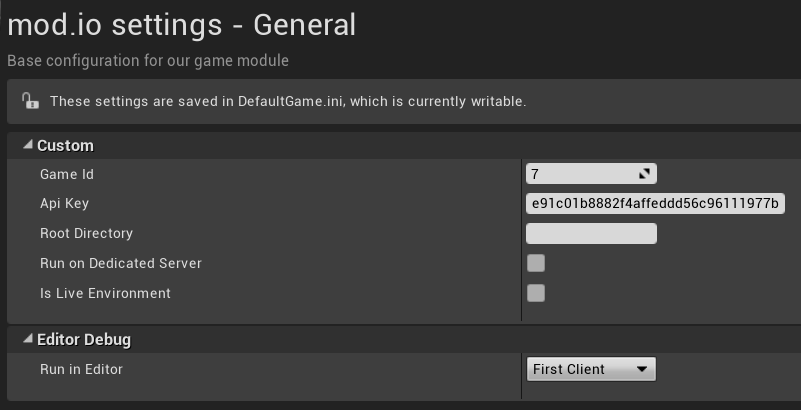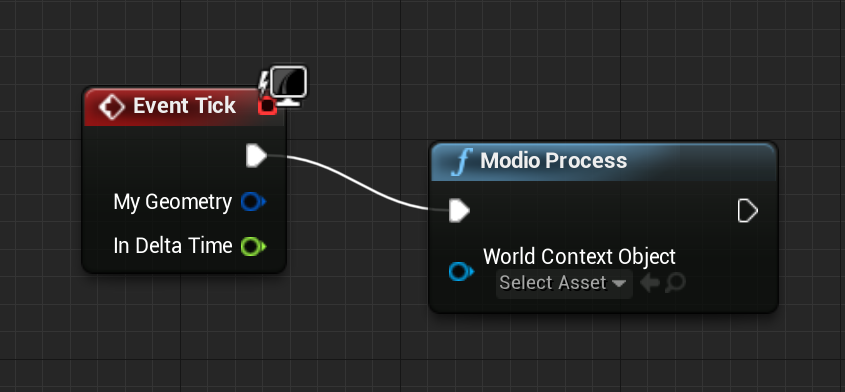-
Notifications
You must be signed in to change notification settings - Fork 14
Home
Welcome to mod.io Unreal Engine 4 Plugin. It allows game developers to easily control the browsing and installation of mod files in their games. It provides a C/blueprint interface built on the Unreal Engine to connect to the mod.io API. We have a test environment available which offers developers a private sandbox to try the Unreal Engine 4 Plugin out.
| Feature | Supported |
|---|---|
| Windows 64bits (more platform are WIP) | ✔ |
| Standalone | ✔ |
| Open Source | ✔ |
| Free | ✔ |
| Async Callbacks | ✔ |
| Events | ✔ |
| Email / Steam / GOG authentication | ✔ |
| Prebuilt download and upload queue | ✔ |
| Mod ratings / dependencies | ✔ |
| MIT license | ✔ |
A quick start guide is provided below, in addition to the more detailed wiki.
Modio->GetAllMods(EModioFilterType::SORT_BY_DATE_UPDATED,
4 /* Limit the number of results for a request. */,
0 /* Use the offset to skip over results and paginate through them */,
FModioModArrayDelegate::CreateUObject(ModioManager, &UModioManager::OnGetAllMods));
// ...
void UModioManager::OnGetAllMods(FModioResponse Response, const TArray<FModioMod> &Mods)
{
for (FModioMod Mod : Mods)
{
UE_LOG(LogTemp, Warning, TEXT("Name: %s"), *Mod.Name);
UE_LOG(LogTemp, Warning, TEXT("Description: %s"), *Mod.Description);
UE_LOG(LogTemp, Warning, TEXT("Date updated: %d"), Mod.DateUpdated);
}
}First step is to request a security code to your email.
Modio->EmailRequest("[email protected]", FModioGenericDelegate::CreateUObject(ModioManager, &UModioManager::OnEmailRequest));
// ...
void UModioManager::OnEmailRequest(FModioResponse Response)
{
// Response.code should be 200 if an security code was sent to the provided email
}Finish authentication by submitting the 5-digit code.
Modio->EmailExchange("VBY5A", FModioGenericDelegate::CreateUObject(ModioManager, &UModioManager::OnEmailExchange));
// ...
void UModioManager::OnEmailExchange(FModioResponse Response)
{
// Response.code should be 200 if you are now authenticated
}If your game is running inside a popular distribution platform such as Steam or GOG Galaxy you can authenticate 100% seamlessly.
Modio->GalaxyAuth("csEYJ2MWR53QssNNqFgO87sRN", FModioGenericDelegate::CreateUObject(ModioManager, &UModioManager::OnGalaxyAuth));
reports
// ...
void UModioManager::OnGalaxyAuth(FModioResponse Response)
{
// Response.code should be 200 if you are now authenticated via Galaxy
}Modio->SteamAuth("NDNuZmhnaWdyaGdqOWc0M2o5eTM0aGc", FModioGenericDelegate::CreateUObject(ModioManager, &UModioManager::OnSteamAuth));
// ...
void UModioManager::OnSteamAuth(FModioResponse Response)
{
// Response.code should be 200 if you are now authenticated via Steam
}Download and remove mods locally by subscribing and unsubscribing.
Modio->SubscribeToMod(mod_id, FModioModDelegate::CreateUObject(ModioManager, &UModioManager::OnSubscribeToMod));
// ...
void UMyModioManager::OnSubscribeToMod(FModioResponse Response, FModioMod Mod)
{
// Response.code should be 200 if you subscribed to the mod successfully
}Modio->UnsubscribeFromMod(mod_id, FModioGenericDelegate::CreateUObject(ModioManager, &UModioManager::OnUnsubscribeFromMod));
// ...
void UMyModioManager::OnUnsubscribeFromMod(FModioResponse Response)
{
// Response.code should be 200 if you unsubscribed from the mod successfully
}Share mods by creating a mod profile and attaching modfiles to it.
FModioModCreator ModCreator;
ModCreator.Name = "My Mod";
ModCreator.LogoPath = "ModExample/logo.png";
ModCreator.HomepageUrl = "http://www.webpage.com";
ModCreator.Summary = "Mod added via the SDK examples. Mod added via the SDK examples. Mod added via the SDK examples. Mod added via the SDK examples. Mod added via the SDK examples. Mod added via the SDK examples.";
Modio->AddMod(ModCreator, FModioModDelegate::CreateUObject(ModioManager, &UModioManager::OnAddMod));
// ...
void AModioManager::OnAddMod(FModioResponse Response, FModioMod Mod)
{
// Response.code should be 200 if the mod profile was created
}FModioModfileCreator ModfileCreator;
ModfileCreator.Path = "ModExample/modfile/";
ModfileCreator.Version = "v1.1.0";
ModfileCreator.Changelog = "This is a change log...";
Modio->AddModfile(mod_id, ModfileCreator);Modio->SetModDownloadListener(FModioListenerDelegate::CreateUObject(ModioManager, &UMyModioManager::OnModDownload));
// ...
void UMyModioManager::OnModDownload(int32 ResponseCode, int32 ModId)
{
// ResponseCode should be 200 when a mod was just downloaded
Modio->InstallDownloadedMods();
}Modio->SetModUploadListener(FModioListenerDelegate::CreateUObject(ModioManager, &UMyModioManager::OnModUpload));
// ...
void UMyModioManager::OnModUpload(int32 ResponseCode, int32 ModId)
{
// ResponseCode should be 200 when a mod was just uploaded
}If you are a game developer, first step is to add mod support to your Unreal Engine 4 game. Once mod support is up and running, create your games profile on mod.io, to get an API key and access to all functionality mod.io offers. Next, input your Game ID and API Key under the mod.io Project Settings in your UE4 editor.

Once initialized, you are ready to start interacting with either the Blueprint layer or C++. Both have the same funcionality so it's up to you choosing what fits better to your game.
Interact with mod.io by using the intuitive mod.io functions, callback proxies and structures. Don't forget to connect the Process node yo your Tick function for the callbacks can take effect.

Import the mod.io subsystem and get the Subsystem pointer to start interacting with mod.io. Remeber to call Modio->Process() regularly to process the async funcionality.
#include "ModioSubsystem.h"
// ...
FModioSubsystemPtr Modio;
Modio = FModioSubsystem::Get(GetWorld());
// ...
void UModioManager::Tick(float DeltaTime)
{
Modio->Process();
}Our Unreal Engine 4 plugin is public and open source. Game developers are welcome to utilize it directly, to add support for mods in their games, or fork it for their games customized use. Want to make changes to our plugin? Submit a pull request with your recommended changes to be reviewed.
You can use the standalone build.bat file to compile it after you have done modification to the plugin. If you're looking for integrating mod.io to your game refer to the Getting started guide instead.
cd build
build.bat [UE4 VERSION]
Where [UE4 VERSION] is the UE4 version that will be used for building, it has to be installed on your system beforehand. The following versions are supported:
:: Build with UE4 v19
build.bat 19
:: Build with UE4 v20
build.bat 20
:: Build with UE4 v21
build.bat 21
:: Build with UE4 v22
build.bat 22
:: Build with UE4 v19, v20, v21 and v22
build.bat all
Our aim with mod.io, is to provide an open modding API. You are welcome to view, fork and contribute to our other codebases in use:
- Design is public and open source, the repository can be found here.
- API documentation is public and open source, the repository can be found here.
- Browse engine tools, plugins and wrappers created by the community, or share your own.
- Unreal Engine 4 plugin, easily manage the browsing and install of mods in Unreal Engine 4 games
- Unity Engine plugin, easily manage the browsing and install of mods in Unity Engine games
- Python wrapper, a python wrapper for the mod.io API
- Rust wrapper, rust interface for mod.io
- And more...
- Process and initialization
- User authentication
- Browsing
- Subscriptions
- Listeners
- Schemas
- Delegates



